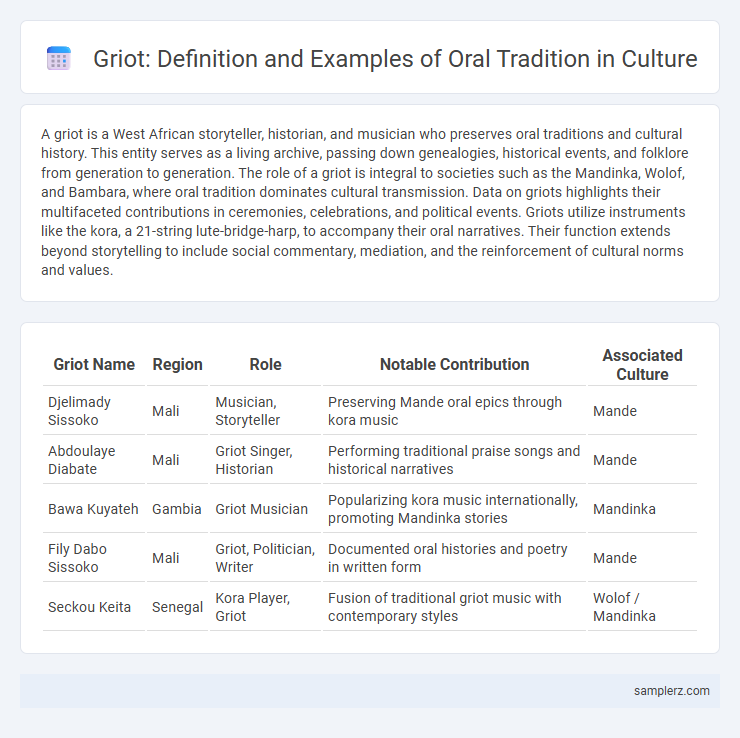A griot is a West African storyteller, historian, and musician who preserves oral traditions and cultural history. This entity serves as a living archive, passing down genealogies, historical events, and folklore from generation to generation. The role of a griot is integral to societies such as the Mandinka, Wolof, and Bambara, where oral tradition dominates cultural transmission. Data on griots highlights their multifaceted contributions in ceremonies, celebrations, and political events. Griots utilize instruments like the kora, a 21-string lute-bridge-harp, to accompany their oral narratives. Their function extends beyond storytelling to include social commentary, mediation, and the reinforcement of cultural norms and values.
Table of Comparison
| Griot Name | Region | Role | Notable Contribution | Associated Culture |
|---|---|---|---|---|
| Djelimady Sissoko | Mali | Musician, Storyteller | Preserving Mande oral epics through kora music | Mande |
| Abdoulaye Diabate | Mali | Griot Singer, Historian | Performing traditional praise songs and historical narratives | Mande |
| Bawa Kuyateh | Gambia | Griot Musician | Popularizing kora music internationally, promoting Mandinka stories | Mandinka |
| Fily Dabo Sissoko | Mali | Griot, Politician, Writer | Documented oral histories and poetry in written form | Mande |
| Seckou Keita | Senegal | Kora Player, Griot | Fusion of traditional griot music with contemporary styles | Wolof / Mandinka |
Introduction to Griots in Oral Tradition
Griots are West African oral historians, storytellers, and musicians who preserve and transmit cultural heritage through generations. Serving as living libraries, they recount genealogies, historical events, and traditional songs using oral narratives and musical instruments like the kora. Their role in societies such as the Mandinka and Wolof is vital for maintaining communal identity and passing down collective memory.
Historical Origins of Griot Storytelling
Griot storytelling traces its origins to West African societies, particularly among the Mande people of Mali, dating back over a thousand years. These oral historians preserved genealogies, cultural narratives, and historical events through music and spoken word, ensuring the continuity of community memory. The griot's role as a custodian of oral tradition highlights the importance of storytelling in maintaining cultural identity across generations.
Roles and Functions of Griots in African Societies
Griots in African societies serve as oral historians, storytellers, and musicians who preserve genealogies, historical narratives, and cultural traditions through generations. They act as mediators in social conflicts, advisors to rulers, and keepers of communal memory, ensuring cultural continuity and social cohesion. Their performances, combining praise songs and oral epics, reinforce collective identity and transmit moral values within the community.
Notable Griot Lineages and Families
The Kouyate family from West Africa stands as one of the most renowned griot lineages, preserving centuries of Mande oral history and epics such as the Epic of Sundiata. The Diabate family, particularly celebrated for their kora playing and storytelling, has significantly influenced the griot tradition across Mali and Guinea. These families serve as living libraries, safeguarding cultural heritage through music, poetry, and historical narration passed down generationally.
Traditional Performances: Songs, Poetry, and Proverbs
Griots are West African oral historians and storytellers renowned for preserving cultural heritage through traditional performances such as songs, poetry, and proverbs. Their lyrical narratives often incorporate musical instruments like the kora, enhancing the oral transmission of history and moral lessons across generations. Mastery of proverbs and poetic forms allows griots to educate communities while entertaining audiences during ceremonies and social gatherings.
Transmission of History and Genealogy by Griots
Griots serve as living repositories of oral tradition, skillfully preserving and transmitting the history and genealogy of West African communities through storytelling, praise singing, and musical accompaniment. Their role as historians and genealogists ensures the continuity of cultural knowledge and identity across generations, often recounting detailed lineages and significant historical events. The griot's performance not only educates but also reinforces social cohesion by maintaining a collective memory rooted in ancestral heritage.
Griots as Custodians of Cultural Heritage
Griots serve as living archives in West African oral tradition, preserving history, genealogy, and folklore through storytelling, music, and poetry. Their role as custodians of cultural heritage ensures generations receive a continuous transmission of community values and ancestral knowledge. These oral historians maintain social cohesion by linking past and present, reinforcing identity within countless ethnic groups like the Mande and Wolof.
Influence of Griots on Contemporary Arts and Music
Griots, traditional West African storytellers and oral historians, have profoundly influenced contemporary arts and music by preserving and transmitting cultural narratives through song and poetry. Their mastery of rhythm, melody, and improvisation has inspired modern musicians and performers, integrating ancestral storytelling techniques into genres such as jazz, blues, and hip-hop. The fusion of griot traditions with contemporary artistic forms enriches cultural expression and ensures the continuity of oral heritage in today's globalized world.
Modern Day Griots and Their Evolving Role
Modern day griots continue to preserve West African oral traditions while integrating contemporary themes such as social justice and political commentary into their narratives. They utilize multimedia platforms, including music, poetry, and digital storytelling, to reach broader audiences globally. This evolution reflects the griot's adaptive role as both cultural historian and modern-day activist, ensuring the relevance of ancestral wisdom in today's society.
Preserving Griot Traditions in the Digital Age
Griots, the West African oral historians and storytellers, play a crucial role in preserving cultural heritage through generations. Digital platforms enable the archiving and dissemination of griot narratives, songs, and histories, ensuring their survival amidst modern challenges. Integrating multimedia technologies with traditional oral practices revitalizes griot traditions while expanding their accessibility worldwide.

example of griot in oral tradition Infographic
 samplerz.com
samplerz.com